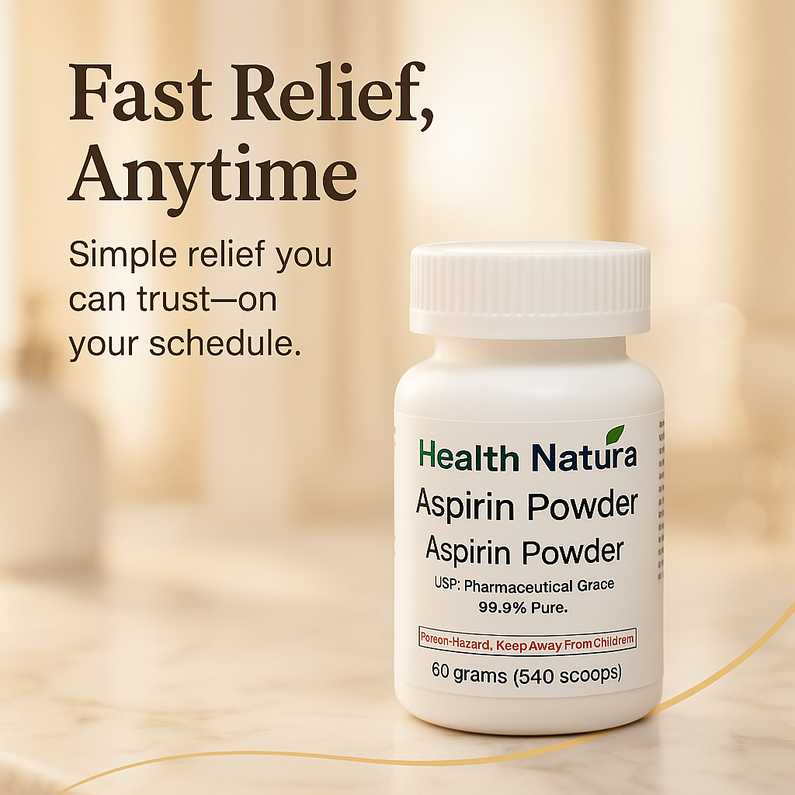Pure Aspirin Powder: How Our Process Ensures Purity
Aspirin, also known as acetylsalicylic acid, is one of the most widely used medications in the world.
It is a pain reliever and anti-inflammatory drug that millions use daily to treat common ailments like headaches, muscle pain, and fever.
Got questions? Ask the author in the comments section at the bottom of this page.
For over a century, aspirin has stood the test of time as one of the most widely used and trusted over-the-counter medications. Its effective formula, crafted from natural ingredients and synthesized through a simple chemical process, continues to make it an indispensable drug for alleviating pain, combating inflammation, and enhancing the daily comfort of countless individuals.
But what exactly is aspirin made of, and how is it produced?
The Production Process Aspirin is produced by chemically reacting salicylic acid with acetic anhydride in a process known as acetylation. This process yields acetylsalicylic acid (ASA), which is the active component in aspirin. The ASA is then purified and milled into a powder.
A Trusted Source For Purity
Our aspirin powder has zero added ingredients and is 99% pure aspirin (acetylsalicylic acid) with no additional fillers, starches, binders, or preservatives commonly found in other aspirin products. The remaining 1% residue is salicylic acid and moisture.
Cross-Contamination Prevention
We use dedicated equipment to process and package our aspirin powder, meaning there is zero chance of cross-contamination with other products in our facility.
Comprehensive Testing And Quality Control
Quality control steps are performed to ensure each batch of aspirin meets strict purity standards before being packaged and distributed for sale.
We utilize state-of-the-art testing technologies to guarantee the highest accuracy in confirming quality and detecting contamination. Every single material that enters our facility undergoes meticulous screening, ensuring safety and quality at all times. Furthermore, we diligently perform additional tests and implement quality control measures at every stage of the production process, ensuring the utmost precision and excellence in our products.
Our testing protocols include:
- Identification of the product.
- Verification of the ingredient.
- Verification that the ingredient is in its active form.
- Analysis of broad spectrum contaminants.
- Analysis of microbial contamination.
Got questions? Ask the author in the comments section at the bottom of this page.
Dr. Peter Kassner, NMD - Biography
Dr. Peter Kassner, NMD, is the founding CEO of Health Natura, bringing 29 years of painstaking dedication to the field of naturopathic medicine. His journey in natural healing began in 1993 at the age of 17, when he embarked on his first apprenticeship before even completing high school...
After obtaining both Masters and Doctoral degrees in Naturopathic Medicine, Dr. Kassner established his first pain clinic, Clinical Therapeutics, in Tuscaloosa, Alabama in 1996. This eventually evolved into Health Natura, LLC in 2005, reflecting his expanded mission to make Integrative Medicine accessible to those seeking alternatives to conventional treatments.
Throughout his 19-year clinical career, Dr. Kassner developed Unparalleled Expertise in immunology, cancer treatment protocols, acute and chronic infectious disease management, neuro-immunology, endocrine-immunology, thyroid iodine therapy, and Lyme disease interventions. His extensive training includes certifications in clinical massage, cranial sacral therapy, energy medicine, homeopathy, herbology, Chinese herbology, acupuncture, reflexology, EAV energy diagnostics, IV chelation, chemistry, and supplement compounding.
In 2006, dissatisfied with the state of commercial supplements, Dr. Kassner established Health Natura's first laboratory, specializing in Custom Compounding of preservative-free, excipient-free formulations with minimal ingredients. This commitment to purity and efficacy led him to retire from clinical practice in 2012 to focus entirely on Health Natura's supplement program.
Dr. Kassner's approach to naturopathic medicine has been profoundly shaped by his extensive travels throughout Western countries and Asia, where he studied diverse healing traditions. This global perspective informs his unique philosophy: delivering High-Quality, Personalized Wellness Solutions rather than mass-produced alternatives with compromised ingredients...
Today, Dr. Kassner continues to revolutionize the supplement industry through careful formulation and ethical sourcing, making Health Natura a trusted resource for those seeking superior natural health products.
* These statements have not been evaluated by the FDA (Food and Drug Administration). This product is not intended to treat, cure or prevent any disease. Statements of potential therapeutic value are the opinion of Dr. Kassner, ND, and are based on his personal and clinical experience. They should not be construed to endorse, condone or promote the use of any product as a medical treatment for any condition. Consult a medical professional before engaging in any self-care or nutritional supplement regimen to ensure safe and appropriate use.
Dr. Kassner has been active in the field of alternative medicine since 1991.
Recent Posts
-
Why Your New Year Health Goals Fail (And How to Finally Succeed in 2026)
Only 9 percent of Americans eat the recommended daily amount of vegetables [14]. This single statist …Dec 19th 2025 -
Perimenopause Sex Drive: Your Natural Solution Guide for 2026
Perimenopause sex drive fluctuations affect 40% of women, with sexual desire dissatisfaction negativ …Dec 13th 2025 -
Stressed Out? The Real Differences Between Rhodiola vs Ashwagandha (2026 Guide)
Rhodiola vs ashwagandha presents a clear choice for stress management. Both adaptogens deliver disti …Dec 12th 2025





